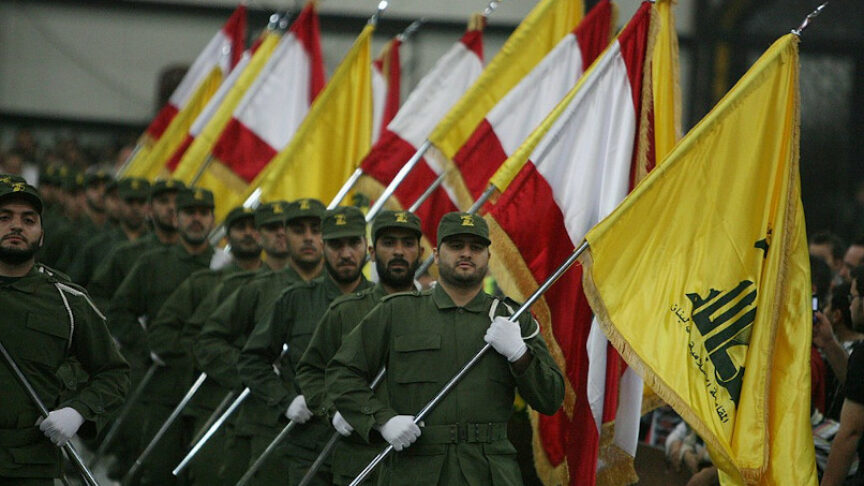Undiplomatic: The risks of Germany’s ban on Hizbullah
There will be little prospect of economic stabilisation and political compromise in Lebanon if the EU isolates one of the country’s major political forces.
It’s not every day that US Secretary of State Mike Pompeo formally praises a political decision in Germany. But, last week, Berlin’s ban on the Lebanon-based Hizbullah earned this questionable honour. Pompeo claimed that, with the decision, Germany had joined “the growing ranks of nations that reject the false distinction between Hizballah’s terrorist operations and a purported ‘political’ wing”.
His statement came after months of US pressure on Germany to take a tougher stance on the group – as part of the Trump administration’s effort to increase the strain on Iran and its allies. Yet he misrepresented the German decision. Despite Pompeo’s insinuation to the contrary, Germany still shares the position of the European Union, which added the Hizbullah’s military wing to its list of terrorist groups in 2013, but does not designate the organisation’s political wing as such.
Instead, the step was an exclusively domestic decision by the Ministry of the Interior. Although the accompanying statement by the ministry brands Hizbullah as a “Shiite terrorist organisation”, Germany does not have its own list of terrorist groups. The decision did not introduce a new designation of the group, but banned Hizbullah activities in Germany. While Hizbullah has no direct representation in Germany, the German police – in a show of force – searched organisations and mosques across the country for suspected connections to the group.
Foreign Minister Heiko Maas supported the decision, saying: “Hizbullah denies Israel’s right to exist, threatens with violence and terror and massively upgrades its rocket arsenal.” He made no mention of the fact that the German government, like the EU as a whole, continues to hold a more nuanced position on the group.
This raises the question of whether the domestic ban may eventually lead to a change in the German position of differentiating between the group’s political and military wing, thereby pushing other EU member states in the same direction. Various European actors call for such a shift. A key advocate of this in Germany is Richard Grenell, the US ambassador to the country and a close ally of President Donald Trump. Trump recently appointed Grenell as acting director of national intelligence, a role the latter has already used to push France to support an EU-wide ban on Hizbullah. The Simon Wiesenthal Centre has been pushing for the same thing.
In Germany, these voices – which focus on Hizbullah’s anti-Semitism and its aggressive rhetoric towards Israel – are taken very seriously. And they are echoed by several organisations and individuals, as well as a considerable majority in Parliament – which adopted in December 2019 a motion demanding a tough course of action to “contain the influence of Hizbullah in the region” and reach “a common European conclusion on the question of the [terrorist group] listing”.
A German decision to engage in wider and more proactive opposition to Hizbullah – one that seeks to push the EU to end the distinction between the group’s military and political wings, as demanded by the United States – would have significant consequences. This would effectively prevent the EU from engaging with an organisation that remains a critical political actor in Lebanon, has formed part of previous Lebanese governments, and currently has 13 representatives in Parliament.
Although not all Shi’ites support it, Hizbullah is the main political party representing Lebanon’s Shia community, together with the allied Amal Movement. And the country formed its current, technocratic government in January with the consent of Hizbullah. Europeans rightly consider the armed element of the organisation as a terrorist group, but they have been keen to ensure that they maintain channels of communication with it as a key political actor in Lebanon – one that is critical to maintaining the country’s stability. This concern has been particularly acute since October 2019, when hundreds of thousands of Lebanese began to demonstrate against Lebanon’s corrupt political system. The collapse of Lebanon’s economy is exacerbating the protest movement – and there are a growing number of violent incidents in the country.
By adopting a proactive policy designed to contain Hizbullah, the EU would help empower the US “maximum pressure” campaign against Iran. For the US, the effort to pressure Hizbullah is an essential part of this campaign, as the group is Iran’s most important regional proxy. The campaign has already dramatically increased the likelihood of a military confrontation between the US and Iran – especially since January 2020, when the US killed Qassem Soleimani, commander of the Islamic Revolutionary Guard Corps’ Quds Force.
Any attempt to push Hizbullah away from a political role in Lebanon will heighten the danger of conflict in the country and the wider region.
Germany and the EU need to make clear that they have a different approach to dealing with major challenges in the Middle East, and that they want to prevent Lebanon from being drawn further into the confrontation between the US and Iran. Ultimately, there will be little prospect of economic stabilisation and political compromise in Lebanon if the EU isolates one of the country’s major political forces. Any attempt to push Hizbullah away from a political role in Lebanon will heighten the danger of conflict in the country and the wider region.
This does not mean that the EU should tolerate aggressive behaviour or violations of international law by Hizbullah or similar actors. Instead, the bloc should condemn such acts and counter them with appropriate measures, such as targeted sanctions. But direct negotiations with Lebanese politicians, including those from Hizbullah, remain an important means through which Europeans can help prevent Lebanon from falling into the abyss.
The European Council on Foreign Relations does not take collective positions. ECFR publications only represent the views of their individual authors.



